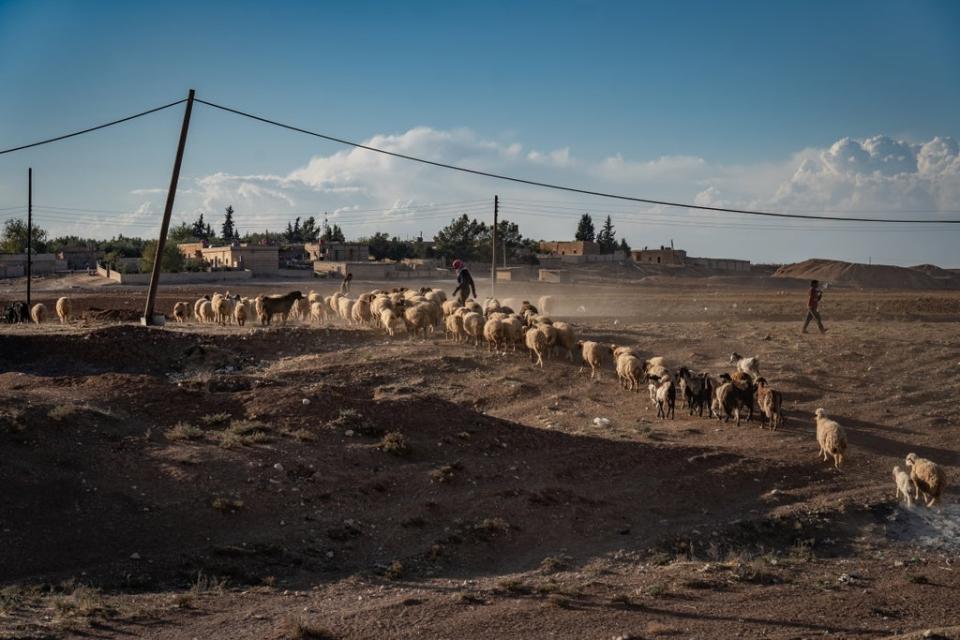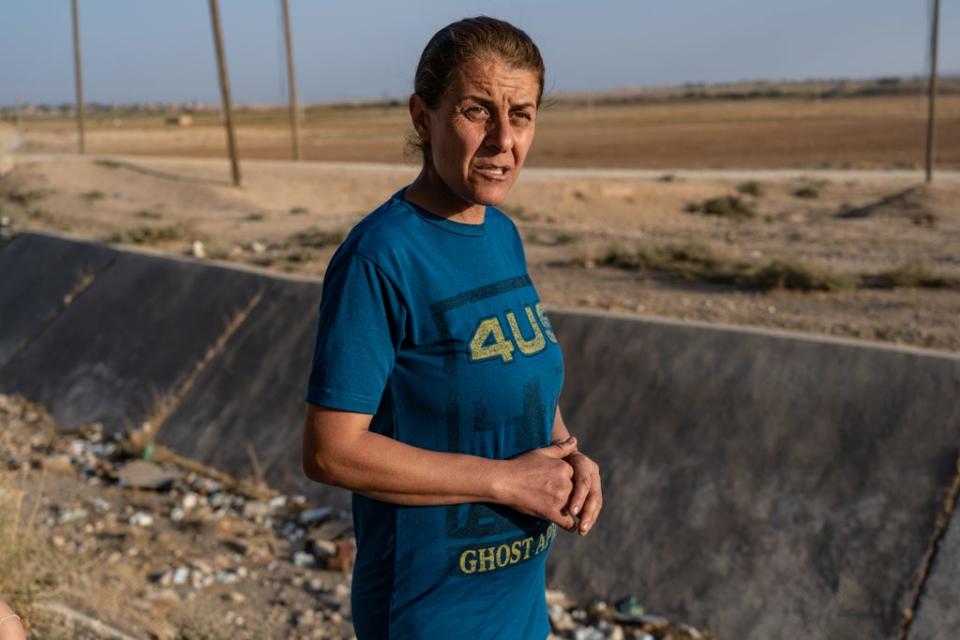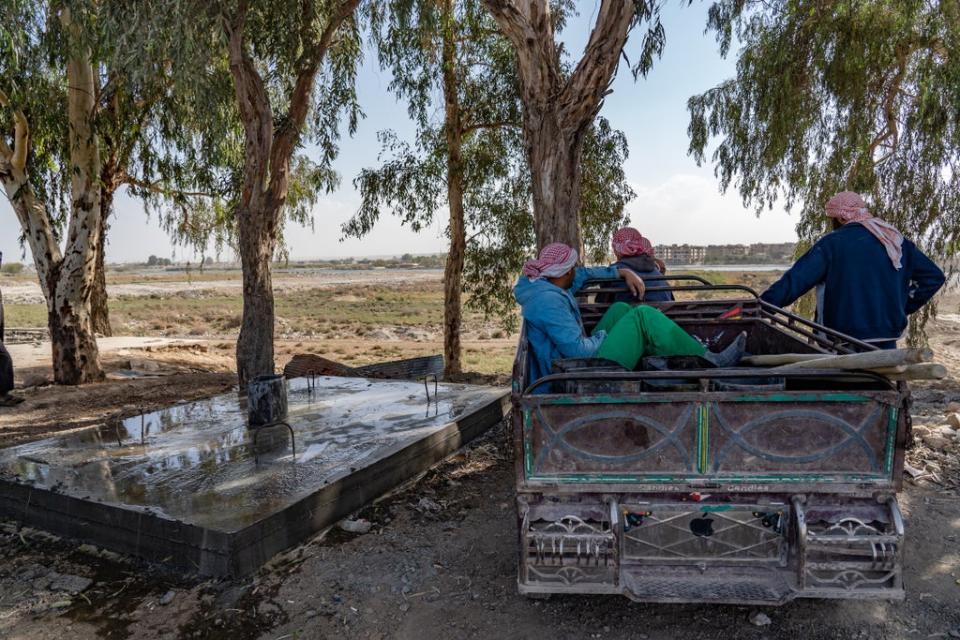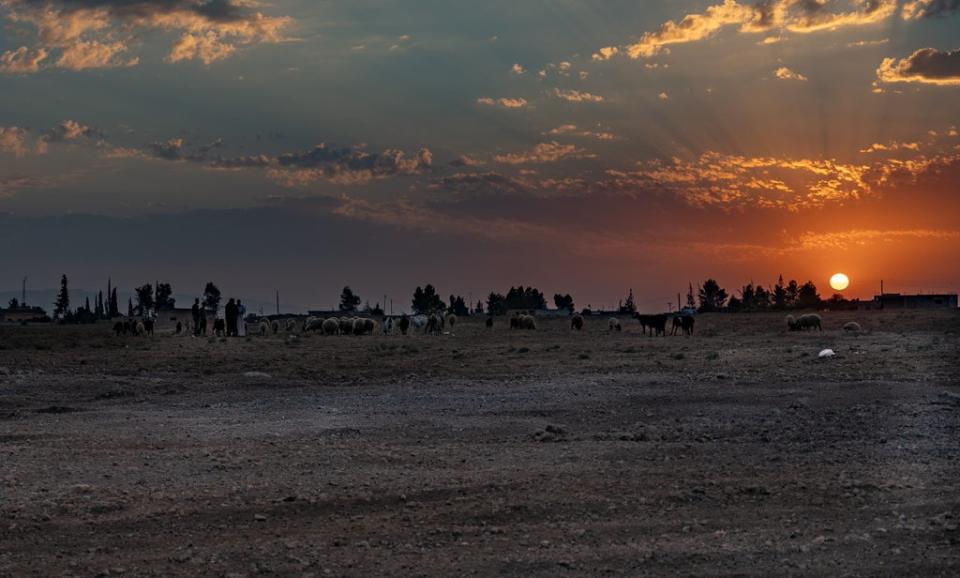Half of Syria has been displaced by war. Now record drought threatens millions more

There is a cruel irony to the village’s Arabic name, Um Gharqan, or “Mother of the drowned”, as it sits perched along the dusty ribcage of a dry river in northeast Syria.
Nestled in the breadbasket region of the county, Um Gharqan was named this because of the punishing floods it has endured over the years thanks to the Khabour River, an important tributary to the Euphrates that runs like an artery through the area. The river has broken its banks twice since 1950, leaving a landscape littered with the remains of homes.
But today Syria is in the grips of the worst drought in 70 years. The Khabour has run completely dry like other rivers, lakes and dams across the war-ravaged country, where crops are failing, livestock is dying and clean drinking water is becoming increasingly scarce. The water shortages are so severe that families, twice displaced by Syria’s civil war and later Isis’s takeover of this area, say they are now preparing to move again.
“I swear to God it was like a paradise and now it has become the definition of a hell,” says Sebru, an Assyrian Christian woman, pointing to a rubbish-lined canal that once diverted water from the river to lush fields of wheat, barley and cotton, orchards of fruit trees and pastures for livestock.
“People have been displaced so many times. But since even finding drinking water is a struggle they have started to leave again.”
Next to her, family friend Siham, also Assyrian Christian, pulls up old photos of the Edenic village on her mobile. In one, shrubs cloud a church, which Isis destroyed in 2014 alongside her home. The scars are deep: Siham’s father and uncle were both killed by the jihadi group.
“Before, you couldn’t see the neighbouring villages because of the trees,” adds Siham, looking over the moonscape that dust has whipped brown.
“We had hectares of land for the whole family to live on. Now there is nothing. We have lost millions of Syrian pounds.”
Um Gharqan village is not an exception.
A coalition of aid groups including Action Against Hunger and the Norwegian Refugee Council warned this year that the total collapse of water and food production in Syria is imminent. Millions will be impacted: more than 5 million people in Syria alone rely on the Euphrates for potable water. Its levels are dangerously low.
With the UN’s annual climate change conference opening in Glasgow this weekend, UN chief Antonio Guterres reminded the world that we are still on track for a “climate catastrophe”.
I swear to God it was like a paradise and now it has become the definition of a hell
Sebru, Um Gharqan resident
He predicted a global average rise in temperature of about 2.7C: this would be impossible for a country like Syria that is among the countries most vulnerable to climate change.
In advance of the Cop26 meeting, Save the Children called for an urgent increase in humanitarian funding for Syria because of the drought, saying this year millions have been unable to get access to safe water.
The knock-on impact of this is deadly.
At the start of 2021 the World Food Programme said that a record 12.4 million Syrians, or nearly 60 per cent of the population, were in the grip of hunger.
But after the worst harvest on record, there are serious concerns that this percentage will break new records next year. One of the hardest-hit areas is northeast Syria, which is supposed to be the breadbasket of the country. One NGO official monitoring the crisis told The Independent that, on average, 75 per cent of crop yields in the northeast failed in 2021.
In some districts, such as Hasakah where Um Gharqan is located, those losses topped 90 per cent. Data shows that there will be a 250,000-tonne shortage of bread flour for bakeries in the coming year. Now is the season for ploughing and planting next year’s crop. But the rains have still not come and the rivers are dry and so farmers, who rely on loans to purchase seeds and fertilisers, told The Independent they were afraid to go ahead in case there was yet another failed harvest.

And so it is not just poverty, economic collapse and a decade of wars – including the battle against Isis and more recently Turkey’s incursion into the borderlands – that are threatening people’s lives: drought is the next disaster on the horizon.
Soaring temperatures, pollution, record low levels of rainfall, crumbling water and sewage infrastructure and deliberate interruptions to water supply have created what experts call a “perfect storm”, resulting in hunger, diseases, as well as the near-collapse of dams providing electricity impacting everything from businesses to healthcare.
“We are seeing an alarming increase in cases of malnutrition in the northeast but there is no treatment for it as the main aid crossing is closed; we don’t have the capacity to bridge that gap,” says one official representing a body of international NGOs working in northeast Syria.
“The quality of the water is also decreasing so we are seeing water-borne diseases in areas in Hasakah, Raqqa and Deir ez-Zour, including in camps for the displaced,” the official adds.
Northeast Syria experts also warned The Independent that groundwater is getting dangerously low and salty as an increasing number of people are relying on digging homemade wells. Others are reduced to water trucking.
“But even that source of the water [trucking] is now contaminated and a band-aid response,” the official continued.
"We need viable sustainable alternatives.”

‘The only thing to do is to leave’
A bullet zips past dangerously close, snapping our attention left. And then a burst of gunfire sends a second chatter of ammunition in our direction. We get the message: the guards, who are protecting this farm and a nearby unofficial well, want us to leave.
Up until a few years ago, locals say this plot of land was a waterfront property overlooking Hasakah West dam, which was built in the early 1990s providing electricity, drinking and agricultural water for the area, as well as a popular place to swim.
But the combination of low rainfall, dwindling river levels and soaring temperatures, has seen it dry into a yawning valley. Judging by the gunfire, the tension in this area has soared over the few water resources that are left.
“The dam dried about six years ago, and in the last year with the nearby Khabour River drying completely the situation has got even worse,” says Hassan, a farmer who owns 16 hectares of land and entirely relies on rainwater now the dam has gone.
He says he lost his crop of wheat this year and warns that if the water troubles continue he will have to leave, joining the millions of internally displaced people inside Syria.
“Many people have dug their own wells but the groundwater is salty, and so we are having to buy water in from a different village if you can afford. Even then you can’t get fuel for the generator to irrigate the fields.
“The only thing to do is leave.”
But the problem for many is deciding where to go, given Hasakah West is not the only dam in trouble.
Record low water levels in the Euphrates have also devastated the Tishreen and Tabqa dams, which are located to the southwest of Hasakah and serve some 3 million people in northern Syria in terms of electricity and water.
There is little drinking water or food for humans, let alone our animals
Zakiya, a shepherdess
According to data collected by a monitoring group and seen by The Independent, over the summer the water levels in both nearly sunk to what is known as the “dead level”. If that happens it can cause permanent damage to the machinery. It also means the production of electricity stops and the affiliated water stations depending on it are also forced to grind to a halt.
Martin Griffiths, the UN’s relief chief, warned that in late June that nearly half of the drinking-water stations along the Euphrates river were “significantly or severely impacted by critically low water levels”.
One of them is located downstream of Tabqa dam along the waterfront by Raqqa, once the capital of Isis’s caliphate.
There, chief engineer Ali Salim says that a few months ago levels of the Euphrates had sunk so low they had to stop the pumps to prevent them from breaking. It cut off water to swathes of the struggling city, which is home to about 400,000 people and is still largely rubble from the brutal battle to oust Isis.
“The flow of water has fallen from around 600 cubic metres per second to an average of between 150-200 cubic metres per second,” he says, looking at banks of silt that over the years have steadily risen out of the sinking water.
“It has affected tens of thousands of people,” he adds.
Like many in northeast Syria, Salim blames climate change but also Turkey, where the Euphrates originates, claiming that Ankara is deliberately not honouring international water treaties.
It’s like gambling: every year I plant and wait for the rainfall
Brekha, a farmer
It echoes statements made to The Independent by the Kurdish water authorities and the Kurdish-led Syrian Democratic Forces (SDF), which are locked in a protracted conflict with Ankara.
Turkey sees the SDF, particularly its main component, the People’s Protection Units (YPG), as an extension of the Kurdistan Workers’ Party, a Turkey-based Kurdish militant group that has been designated a terrorist group by Ankara and Washington.
In 2019 Turkey even launched a cross-border offensive against the Kurds in Syria and together with Syrian-affiliated militias continues to occupy several Syrian border towns.
The Turkish authorities have vehemently denied strangling the water supply to Kurdish-run territory and insist that Turkey is suffering from the same drought, so its water levels are also low.
But this has been disputed by data collected by the monitoring. The data shows when Tabqa and Tishreen dams were nearing “dead level”, water levels upstream in Turkey’s Lake Ataturk were apparently on the rise.
And the United Nations has raised concern about interruptions to Alouk water station in Ras al-Ain, the main station in the area which has been under Turkish and Turkish-backed faction control since the autumn of 2019.
Under a deal, Turkey is supposed to ensure Alouk continues to release water to Hasakah in exchange for electricity from the Kurdish-led authorities.

But Save the Children said last week that since January 2021 the station has seen 89 days of no pumping whatsoever, and 142 days functioning below half of its usual capacity.
It has left parts of Hasakah – one of Syria’s largest cities – without access to piped water for two months.
Turkey has vehemently denied the allegations of tampering with Alouk. Tanju Bilgic, a spokesperson for the Foreign Ministry, said in July that the interruptions were caused by the Kurdish forces “deliberately” obstructing electricity to the water station and the region.
“These power cuts disable the functions of the station to provide water, and aggravate the humanitarian conditions in the region,” he said.
The Kurds deny this. Caught in the crossfire are the civilians.
Sitting on a rock at the bottom of another dry river bed, Zakiya, a shepherdess fears the water war is only going to get worse as tensions between the two sides flare and a sketchy ceasefire falters.
She speaks as her goats graze on the only sustenance available: thorns reaching out through the cracks on the ground.
“There is little drinking water or food for humans, let alone our animals,” she adds with a sad wave of her hand.

‘If there is no rain it will be a catastrophe’
Farmers in the villages surrounding the dry rivers stare at the sky and worry that it is October but the rains have still not come.
They discuss how to hedge their bets for the next year, which is looking increasingly grim.
Everyone has to decide now whether to take out loans to buy seeds and fertilisers to plant their fields: a huge risk if the drought blights another harvest.
“It’s like gambling: every year I plant and wait for the rainfall,” says Brekha, a fruit and wheat farmer, as he nervously wrings his hands. “Without the river, without the dam, if there is no rain it will be a catastrophe. “
Many discuss moving to another part of Syria, or even trying to go abroad, he adds. Climate refugees are a very real possibility.
And this is why the crisis in Syria is not something the outside world can simply ignore, or hope remains contained in Syria alone. Neighbouring Iraq is also in the grips of one of the worst droughts in its modern history and there, people are also on the move.
“What we’re witnessing is a potential ecological collapse in northeast Syria from both climate-caused droughts and conflict-linked environmental damage,” says Wim Zwijnenburg, who works for Dutch peace organisation PAX and has written numerous reports on the region.
Oil pollution, lowering groundwater levels and increased solid waste problems are adding to the myriad of woes.

“People are desperate and want to leave Syria, fearing they have no future in what they expect to become a dry and toxic wasteland,” says Zwijnenburg.
But he says the solution is not for the world to wait for that to happen and deal with the consequences later. The international community and the Kurdish authorities should heed calls “to make the region green again”.
Many fear that might be too late.
Back in Um Gharqan the sun is fading into a cloud of dust kicked up by a group of shepherds and their flocks searching for grass in the wasteland.
It creates a kind of a bruised milky glow that makes it feel like the end of times.
“Water is the source of life; if there is no water life dies,” says Brekha suddenly, with a sigh.
“All we can do is put our faith in God to protect us from starving.”
Read More
The fatigue over northeast Syria must end before it’s too late to stop the region’s deepening crisis
Syria signs Paris Agreement - leaving US only country in the world to refuse climate change deal
Climate change key in Syrian conflict – and it will trigger more war in future

 Yahoo News
Yahoo News 